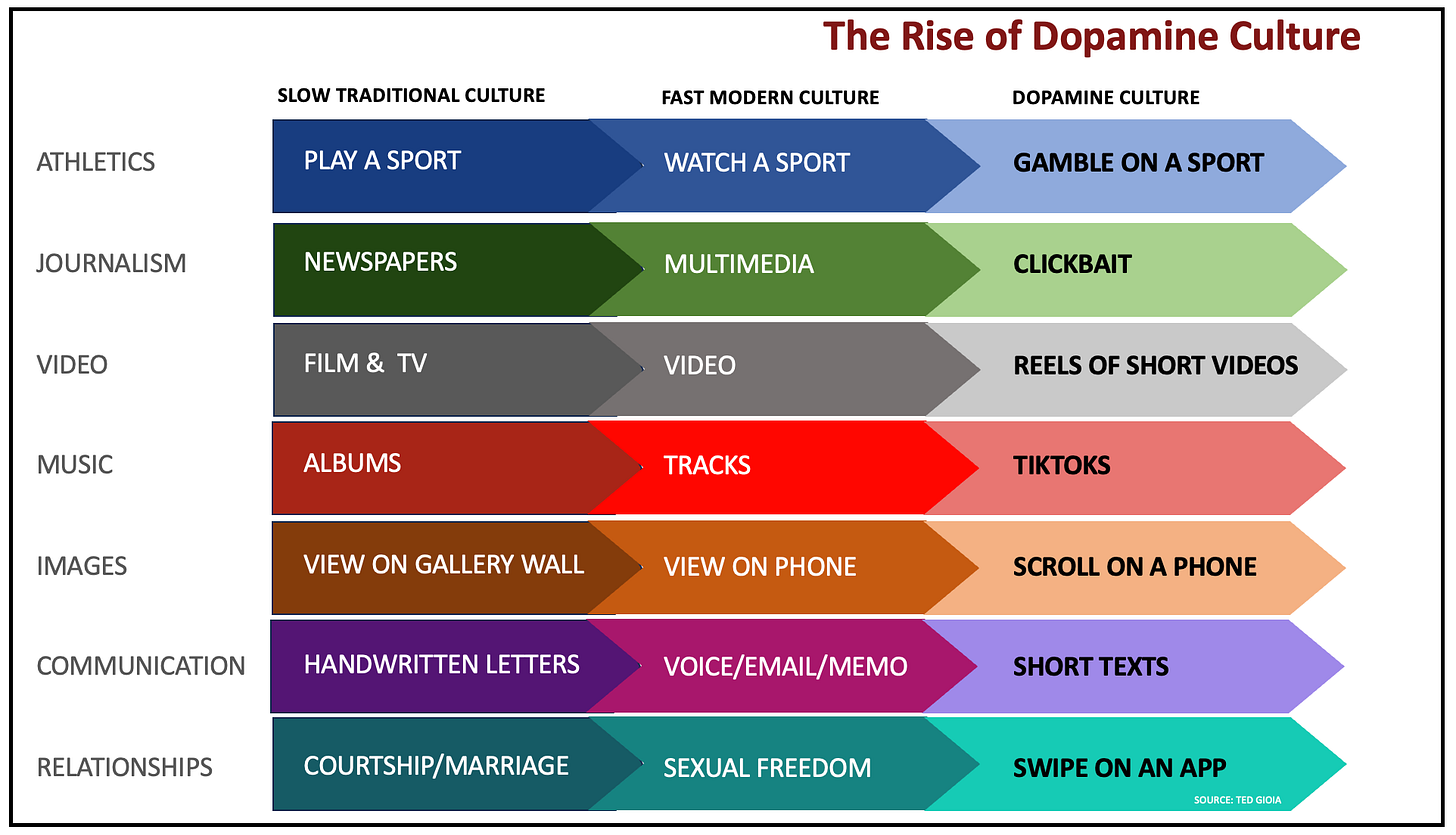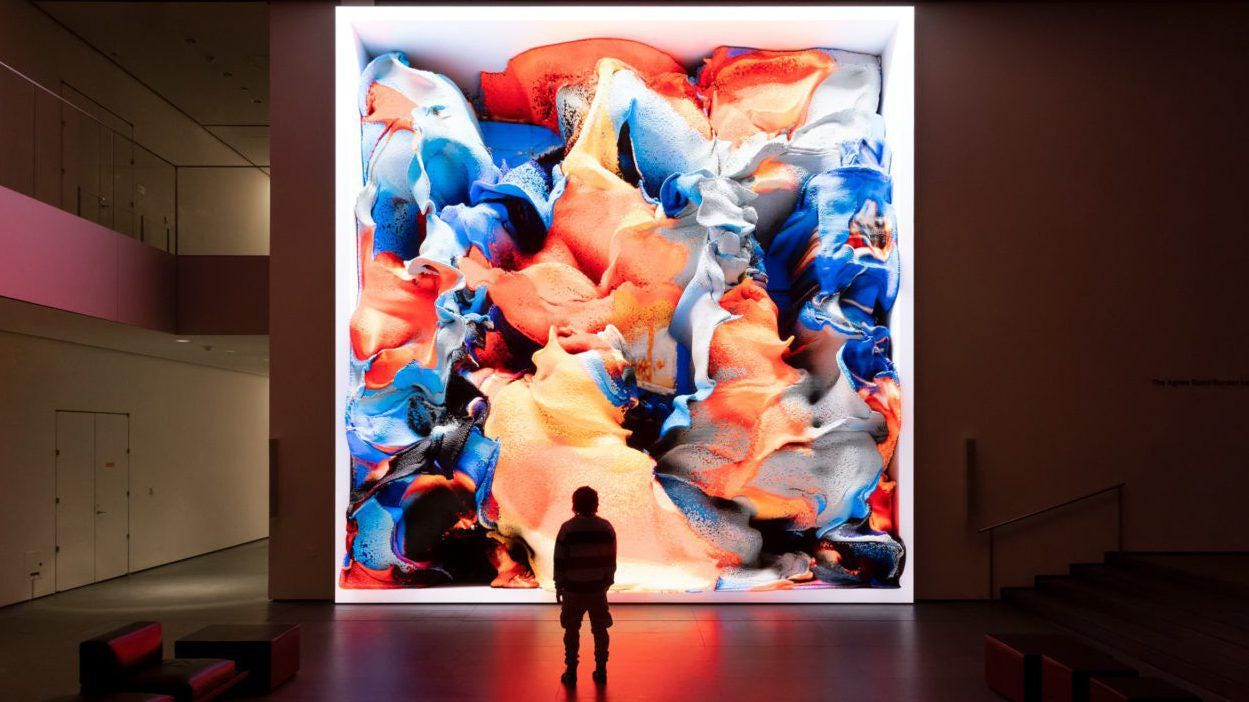Entering the Post-Growth Era, the Rise of Dopamine Culture, and Roundup #31
As we delve into the age of AI gadgets and moon time, we prepare for swear word symphonies, solar-powered eyeballs, and ketchup's usurper.

This issue starts by unpacking a future-focused perspective I’ve been obsessing over for a long time—and it wraps with a fresh scoop of perception on how our culture is changing today.
In between, the roundup brings together power plays, social shifts, and plenty of new technology.
Let’s start big, roll quick, and look out — welcome to Issue 31!
One Big Thing
Entering the Post-Growth Era
We must redefine our visions of the future in a baby-bust economy
The world’s population boom is coming to an end. Birth rates are falling globally, even in places like China and Africa, which are historically known for high growth. Japan just hit a record low, with the government calling it a “critical state.” While the reasons (like antinatalism) are interesting, the impact is even more significant.
This decline isn’t just about closing maternity wards and shrinking schools. Greying economies also struggle to innovate. Young minds are the engine of disruption, and with fewer youngsters around, economies might sputter. Even the US is seeing states with low birth rates facing financial strain.
So, what can be done? Policies to boost birth rates have a spotty track record. Sweden and France have some success stories, but forcing personal choices often backfires. While scientists can now grow a whole model of a human embryo without sperm or egg, these artificial advancements may face human resistance.
In turn, baby-bust economies will adapt by investing heavily in education (think human capital for a smaller workforce). AI will help fill labor gaps. Immigration policies will evolve. Wellbeing and sustainability will be prioritized.
The bottom line:
Growth has always been our society’s focus, but the fuel for that growth – more people, disruptive innovation, new businesses – is slowing down. This post-growth era calls for a rethink. Our future is less about “bigger is better” and more about innovation and efficiency. We must rethink how we define success, progress, and prosperity—all without needing relentless expansion.
The Roundup
AI Adventures
Text-to-Song,
and it’s already nearly at pro-level quality
AI Gadget Era,
welcome to “the beginning of a new technological era”
Tech Tidbits
3D Bioprinted Living Human Skin
bringing us a step closer to more natural-looking and aesthetically pleasing reconstructions
Digitally Scented Interiors,
putting the power of aromatherapy into your next Lincoln automobile, with smells like Violet Cashmere, Twilight Embers, and Ozonic Azure.
Air Swipe Bag
made from NASA’s nano-material, called Aerogel, aka “solid smoke”
Power Plays
Sand Battery,
using a giant steel silo of sand to turn excess electricity into stored heat
Solar Powered Neuroprosthetics,
AKA, Self-powered Bionics — or just solar panels in your eyeballs
Moon Standard Time,
the US is aiming to set international norms beyond Earth’s orbit
Gravy,
The new ketchup, because Heinz says so
Social Sphere
Poking,
the OG Facebook feature has resurfaced
Trendbaiting,
the rising backlash against the term-coiners, especially on TikTok
The C Word,
and this shifting preference toward swear words
What To Watch For
The Rise of Dopamine Culture
As attention spans shrink, engagement shifts, and we enter a post-entertainment era
We’re living in a world obsessed with instant gratification. Our brains crave the dopamine rush that comes with short bursts of stimulation and positive reinforcement. This cultural phenomenon, dubbed the “Dopamine Culture” byTed Gioia, is driven by the neurotransmitter dopamine, a key player in motivation, reward, and pleasure.
In a world overflowing with information and entertainment options, audiences love experiences that deliver a quick dopamine hit. More than ever, we all want concise, stimulating, and emotionally engaging content. Passive entertainment now struggles to hold our attention.
The rise of this Dopamine Culture has us all entering a “post-entertainment” era, where interaction and participation are king. The future belongs to informative, rewarding experiences that keep us actively engaged. (I dig deeper into this topic and its impact on brand experience design on my agency’s site.)
Prompting the Future
From AI Whisperers to Funky Foods, let’s dive back into the Michael Jordan of issues— #23.
There were big ideas:
Prompting the Future: The magic of generative AI lies not just in the technology but in the prompts that guide it. From business applications to mind-blowing art, skilled prompt engineers are in high demand.
Learning in the Age of AI: The issue concludes with my own prediction: AI will revolutionize education, but easy access to information might hinder learning. The future of education lies in creating a balance between accessibility and the challenges that fuel true learning.
… and there was a wild roundup exploring:
Biotech Breakthroughs: Get ready for organoid intelligence (grown biocomputers) and cell painting, a simpler method for drug development.
Sci-Fi-Inspired Surfaces: Imagine lightweight, eco-friendly paint inspired by butterflies, self-deicing roads, and next-generation displays with metasurface pixels.
Funky Food Frenzy: The future of food might include lab-grown mammoth meat (a PR stunt!), convenient powdered beer, and even vibrating pills for digestion.
You can jump back into it all here.
The New New brings together the important and the irreverent across emerging experiences, culture-driven experiments, and scoops of perception.
Each month(ish), this is pulled together by me, Brent Turner, and published on LinkedIn, Substack, and my site.
Okay, I’m off to find my next dopamine hit.
- B
⌘





"Our future is less about “bigger is better” and more about innovation and efficiency. We must rethink how we define success, progress, and prosperity—all without needing relentless expansion"-- I should think AI is going to make up for our loss of innovation. Maybe not in every field but enough. It is also possible that fewer human beings might develop an even higher level of creativity.